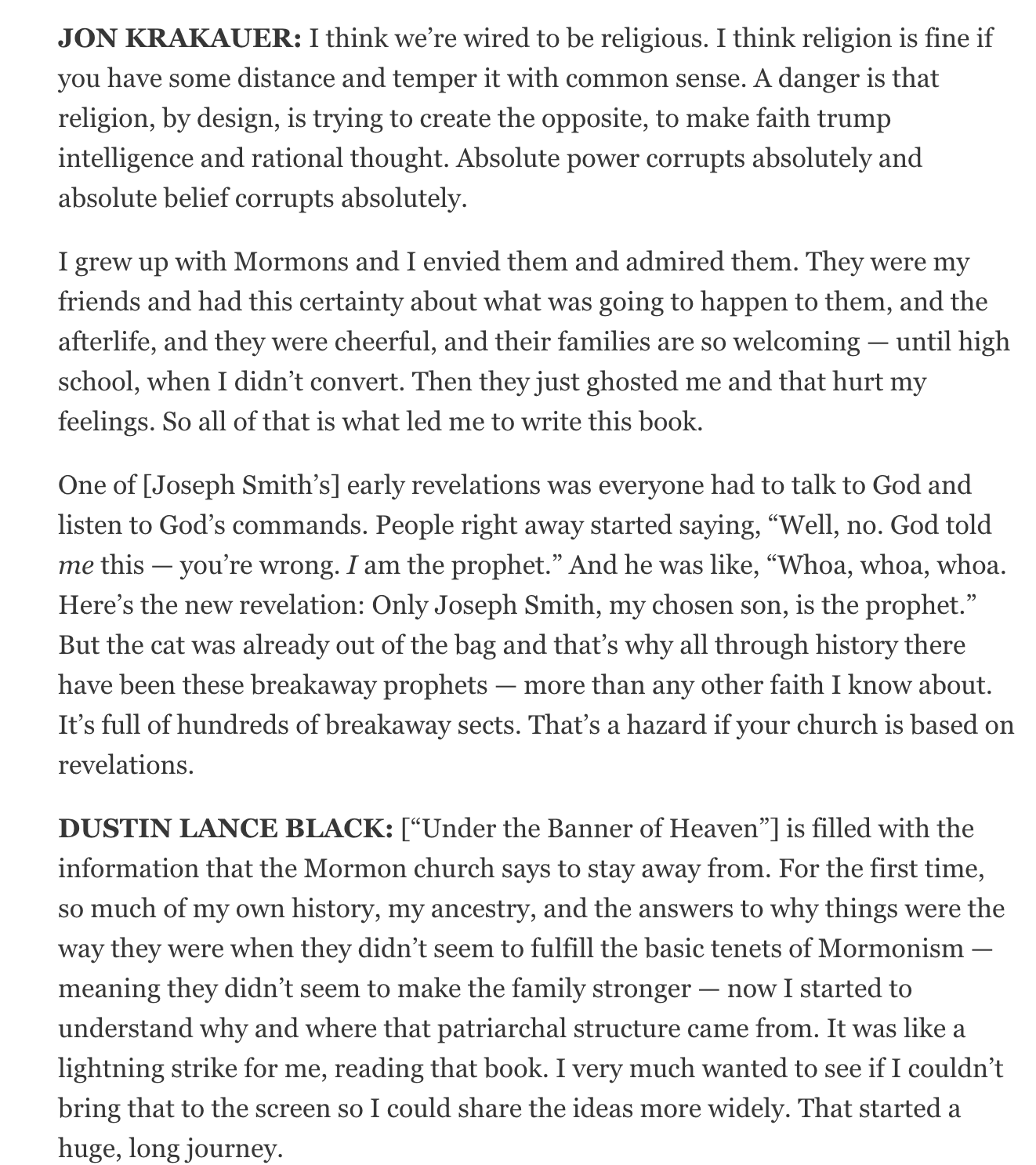Jon Krakauer stated that he wrote Under the Banner of Heaven because his Latter-day Saint friends "ghosted" him.
- Type
- News (traditional)
- Hearsay
- Scribed VerbatimDirectJournalism
- Reference
Dana Harris-Bridson, "If ‘Under the Banner of Heaven’ Made Mormons Angry, the FX Series Will ‘Make Them Apoplectic’," Indie Wire, April 28, 2022, accessed June 1, 2022
- Scribe/Publisher
- IndieWire
- Audience
- Internet Public
- Transcription
JON KRAKAUER: I think we’re wired to be religious. I think religion is fine if you have some distance and temper it with common sense. A danger is that religion, by design, is trying to create the opposite, to make faith trump intelligence and rational thought. Absolute power corrupts absolutely and absolute belief corrupts absolutely.
I grew up with Mormons and I envied them and admired them. They were my friends and had this certainty about what was going to happen to them, and the afterlife, and they were cheerful, and their families are so welcoming — until high school, when I didn’t convert. Then they just ghosted me and that hurt my feelings. So all of that is what led me to write this book.
One of [Joseph Smith’s] early revelations was everyone had to talk to God and listen to God’s commands. People right away started saying, “Well, no. God told me this — you’re wrong. I am the prophet.” And he was like, “Whoa, whoa, whoa. Here’s the new revelation: Only Joseph Smith, my chosen son, is the prophet.” But the cat was already out of the bag and that’s why all through history there have been these breakaway prophets — more than any other faith I know about. It’s full of hundreds of breakaway sects. That’s a hazard if your church is based on revelations.
DUSTIN LANCE BLACK: [“Under the Banner of Heaven”] is filled with the information that the Mormon church says to stay away from. For the first time, so much of my own history, my ancestry, and the answers to why things were the way they were when they didn’t seem to fulfill the basic tenets of Mormonism — meaning they didn’t seem to make the family stronger — now I started to understand why and where that patriarchal structure came from. It was like a lightning strike for me, reading that book. I very much wanted to see if I couldn’t bring that to the screen so I could share the ideas more widely. That started a huge, long journey.
JON KRAKAUER: Imagine started calling me about my book soon after it was published. I didn’t even really know who Imagine was. I kind of knew who Ron Howard was.
RON HOWARD: I was fascinated that [the Lafferty] family, by all metrics, was really succeeding and flourishing in the world and completely dissolved into this tragic story. What were those influences? Some of the same things that made them strong and connected and powerful were suddenly distorted and these seeds of fundamentalism and extremism were planted. I also thought it was incredibly dramatic. I think Brian saw something simpler, but vitally important.
BRIAN GRAZER: I thought it would be a compelling, grizzly thriller. [laughs] I thought it would be a forceful, kind-of-like-“In Cold Blood” thriller. It had me thinking of those movies in the ‘50s and ‘60s, just really gritty and kind of dark. I like edgy stuff that has some sort of internal soul. I thought it was a cautionary tale about the dangers of extremism. If we’re able to cinematically animate this, I think it might have a strong effect on people.
- BHR Staff Commentary
- Citations in Mormonr Qnas
The B. H. Roberts Foundation is not owned by, operated by, or affiliated with the Church of Jesus Christ of Latter-day Saints.

